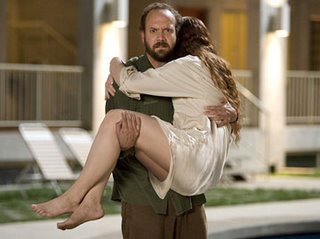Lady in the Water

I was trying to ignore the critics on this one.
In the days leading up to its opening, Lady in the Water was getting sunk by terrible reviews. While I was certainly concerned, I also remembered that The Village got similar treatment and I esteem it to be M. Night Shyamalan’a best film and the finest of that year.
I’m afraid that the lion’s share of critics are right. Lady in the Water does not work and is, at least in my opinion, his first miss-step as a filmmaker. While I love where Night’s head and heart are at, I think he tried to communicate them in a way that was clumsy, cumbersome, lacking in suspense and menace, and frankly, unexciting.
The Bob Dylan-soaked Lady in the Water is about an apartment super named Cleveland Heep, a sad-sack of a man who we will later learn is harboring agonizing demons. Heep is not the quintessential everyman, he is something even more pathetic. One night he discovers a naked woman in the complex pool. She says her name is Story and that she is a narf, an ancient creature sent to humanity to save it from itself. But there are evil forces stalking her, intent on killing her and any chance for humanity’s future with her. Believing her tale to be true, Cleveland sets about gathering the tenants to protect her on her way home.
If it all sounds a bit too far fetched to be believable, it is. That is both Lady in the Water’s greatest strength and it’s greatest weakness. Night originally developed the story as a bedtime tale for his children and later thought it would make a good movie. It is intended to play like an ancient myth, and indeed, is compared within the film to the ancient Asian fables.
Myths always involve elements of the supernatural world crashing into our own tidy, rational existences. We accept that. But we don’t accept it in this film and, quite frankly, I am not sure why.
When the great myths of our disparate cultures were crafted, they were set in the time periods in which their authors lived. I wonder if the contemporary readers of Jack and the Beanstalk guffawed at giants and cloud-ascending plants. If they did, then we are not so different. If they did not, and their lives allowed for elements of magic and supernatural intrigue to flesh out all-too-human issues, then it is the 21st century that is all the poorer for it. (There is a scene in which a giant eagle swoops down to rescue one of the protagonists. My initial reaction was one of incredulity--despite the fact that the actual shot is easily the most spectacular in the film. My second reaction was a guilty admission that the same thing happened in The Lord of the Rings and I sure didn’t have a problem with it that time. Was it simply because the context of LOTR allowed for the possibility of giant eagles while the context of Lady in the Water, on its face, did not?)
Night’s films are all message driven, and since the dawn of time, human beings have used various forms of mythology to communicate greater truths. What more likely vessel for his messages than a film crafted to look and feel like an ancient story of good vs. evil? And there are some great messages in this film. Hope, even in the midst of utter and absolute chaos (TV’s throughout the film showed video of helicopters on the attack, eerily reminiscent of nightly news images from Lebanon), is always to be sought after. We all, each of us, have a purpose and a part to play in the greater production of human history, even if we don’t know what it is or how we are to go about unleashing it.
But Night trips himself up just as the story gets interesting. While he’s always made cameos in his films, in Lady in the Water, he gives himself a supporting character role, and not just any role--he’s the guy who, inspired by Story’s magic, writes a book that will change the world. That combined with the gruesome (and the film’s only) killing of a film critic (obviously I wasn’t the only one who thought The Village’s reviews were off base) make for Night’s most egotistical, self-indulgent and self-absorbed film.

And yet, I found myself oddly moved. It’s more than the fact that Night is obviously--even here--an extremely rare and talented filmmaker. Of his generation, he alone, perhaps, is the true auteur, always bending toward originality and creativity, even if it is not always decipherable or coherent. And that represents a certain amount of laudable bravery. If there is a very tenuous line between genius and madness, Night walks it.
Will Lady in the Water sour me to future Night projects? Not at all. If anything, the worse things get in the world, the more we need “Story’s” like his. Even the ones that don’t quite float.


2 Comments:
Something about "having to believe" at the end? Having to believe in mythic fairy tales to keep the world from ending? Because everyone's losing their imagination? That's the big theme? Ummm...are the Neverending Story people going to sue?
Sing it with me now: Never ending STOR-EEEEEEE! Aw ah ah, aw ahah, awahah!
While you might be able to twist that into a subplot, no, the "have to believe" issue is not part of this film. This is more of a "believe it or not, it's gonna happen" movie.
But it's always fun to invoke the NES dragon twice in nearly as many posts!
Post a Comment
<< Home